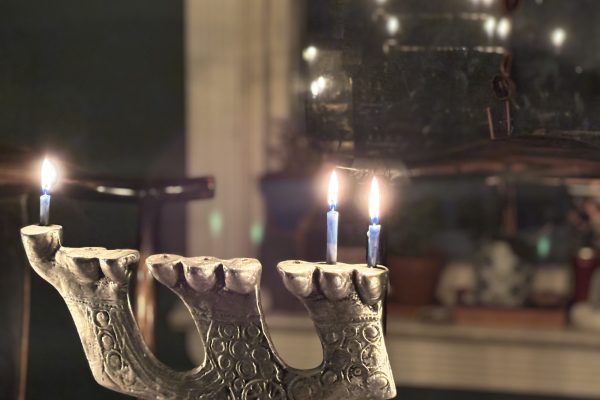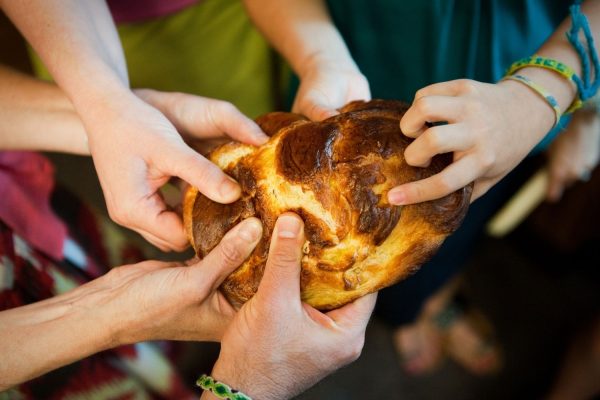Note from Ritualwell: The framework presented below is similar to, yet differs from, the one created by D’vorah Horn in her Teshuvah Cards: Elul to Yom Kippur. Both frameworks use the system of the sefirot to support contemplation. They can be used in conjunction to inspire different avenues of reflection.
Many people are familiar with the seven weeks from the 2nd day of Passover to Shavuot, where we use seven sefirot as a framework to work through the weeks and days. I’ve developed a similar, but simpler ritual to review the past year in preparation for Rosh Hashanah. There are seven weeks between Tisha B’Av and the New Year, so it’s a perfect time.
I just use one sefirah as the framework for a whole week (rather than breaking the week further into seven days). And, since this is a review of the past year, I go backward from Malkhut to Hesed. The framework is a series of questions and thoughts for contemplation, to help prepare for a new year. I recommend just spending a little time each day — 5 or 10 minutes — reading the questions, making notes, adding to what you did the day before.
The following dates apply to the current year, 5778/2018. Though this year’s seven weeks have already begun, you can catch up by doing the first week’s review in 30–60 minutes one day.
Here we go:
Week 1: Malkhut, 11–17 Av, July 23–29
Review the past year, making a list of what was “finished” this year (so far as you can tell), either things you accomplished or things that came to completion or apparent end in some other way. These could be in any area of your life: your personal well-being, finances, relationships, house & home, family, earning money, studying, volunteering, creative projects, repair projects, new jobs, travel or vacations … think broadly. Take 5 or 10 minutes to jot down things the first day, and add at least one thing to the list each day.
Week 2: Yesod, 18–24 Av, July 30–Aug 5
Look at the list from last week, and now think of all the channels that had to open for these things to be accomplished: people who helped you or taught you, information you gathered, beings or places of the natural world, dreams or spiritual messages, resources like money or other physical things. This is a little bit like thinking of all that has to happen for food to be on your table, but now focused on your past year and its “deeds,” things that got done.
Week 3: Hod, 25 Av–1 Elul, Aug 6–12
Express gratitude for all that you have recognized in weeks 1 and 2, and see if there are any other moments of gratitude you remember from the past year. Also ask yourself if there is anything you want to do to “give back,” either in new expressions of thanks (to people, other beings, God … ) or reciprocity to them, or to give back by “paying it forward.” Perhaps you remember already actions in the past year where you paid it forward or passed it on; appreciate those too. Also, remember those times when you let yourself be completely receptive (okay, even partially receptive) to the help you received from others. What does that receptivity feel like? Give thanks for that too.
Week 4: Netzach, 2–8 Elul, Aug 13–19
Think of the effort you put out this year, the obstacles that you encountered, and how you dealt with them. This includes how you took responsibility, how you persevered even when it was hard, and how you dealt with resistance or self-doubt.. Recognize your strength and courage and the affirmations you received for acting in strong ways. Who helped you with this?
Week 5: Tiferet, 9–15 Elul, Aug 20–26
Of the things that happened the past year (whether ‘finished’ yet or not), which ones felt most like your authentic self coming to expression? Contemplate these memories and recognize the feelings of wholeness, healing, and satisfaction that come from those moments of authenticity.
Week 6: Gevurah 16–22 Elul, Aug 27–Sept 2
What lessons have you learned from the events of the first year? Go back to Week 1 and think whether there are things that you intended to complete but didn’t, and examine what was the blockage and whether there is something to be learned from that. Perhaps you later realized it was better that you didn’t continue in that effort, or perhaps there is a correction you can make for the future. If there are any other painful events you experienced besides blocking of your action (just this past year!), what were their sources? What fine-tuning or mid-course corrections did you make, and did those help? Give thanks for the lessons.
Week 7: Hesed 23–29 Elul
What in the past year were the gifts you most cherished? Was there anything that felt like a gift beyond your expectations? Where did things come out even better than you had hoped? Did something you dreaded or feared turn out to be a source of blessing, did darkness turn to light or the unknown become a source of insight? Give thanks for this too, and think of how you might “pass it on” by telling others, in stories or other ways.
This is the place where you start the New Year.











